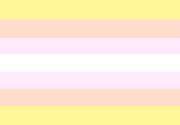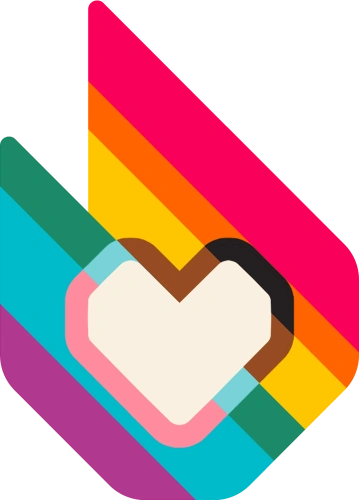Pangender is a gender identity defined as experiencing many or all genders.[1][2] As an identity that is multigender—experiencing or having multiple genders—the number of genders experienced may be unknown or may fluctuate, and they may be experienced one at a time or simultaneously.[2] Pangender encompasses so many genders that is difficult or impossible to list all of them, and can be described as experiencing an immense number of genders.[3][4]
Pangender can also be defined as a multigender which is expansive, nonspecific, vast, and infinite, while still extending only to one's own culture and life experience. There is no limit to the amount of genders a pangender person can have. This identity can go beyond the current knowledge of genders, identifying infinitely with gender, including the hypothetical.[3][4]
It should be noted that the pangender label only includes identities which can be experienced within one's own culture and life experience. Therefore, this identity is not inherently culturally appropriative, nor is it appropriative of other exclusive identities, such as neurogender.[3][4] Pangender falls under the non-binary, multigender, and transgender umbrella terms.[1]
| Stub | |
| This article is a stub. You can help LGBTQIA+ Wiki by expanding it. |
Etymology[]
Pangender derives from the Greek prefix pan-, meaning "all" or "every".[5][6]
Community[]
Pangender Pride Day occurs annually on June 19.[7][8]
History[]
The first mention of the term pangender dates back to 1992 in the preface to The Flock, a novel by Lynn Wilson about living with a dissociative identity disorder. The book talks about gender non-conformity.[9] There were also various Usenet posts in the 1990s that used pangender, such as for discussions of "a pangender- and pansexual-friendly event".[6]
The term "pangender" as it is known today is still a relatively new one, and entries for the word only started appearing on Gender Wiki back in 2015. Because of this, the pangender community is still rather small.[10]
Flag[]

The pangender flag
The most known pangender flag was created by Cari Rez Lobo, known as pangendering on Tumblr.[11]
All colors of the flag are very light and bright, because the white color represents broad inclusion; white light has all the different colors in it, much like how pangender has all the genders in it. The yellow represents all genders not related to female and male, the light red color stands for the transition to the genders associated with the male and female binary, and the violet refers to the transition to and combination of female and male.[8]
Distinction[]
Pansexual[]
- Main article: Pansexual
Though they both contain the prefix "pan," pansexual and pangender are on two completely different spectrums. Pansexual is used to describe someone's sexual orientation, while pangender is used to describe someone's gender identity.[8]
Polygender[]
- Main article: Polygender
Polygender and pangender both exist on the multigender spectrum. However, pan means "all" whereas poly means "many." Both terms, however, describe people who are comfortable with various gender identity labels.[12]
Omnigender[]
Both pangender and omnigender are often described as having similar definitions, if not cited as having the exact same definition.[13] [14] However, in more recent years, there have been some discussions on making pangender and omnigender more distinct terms.[15] [16] [17] There has not yet been a widely agreed way of distinguishing them, but the following list shows examples of how some people may be attempting to separate the two terms:
- Pangender is where a person experiences all genders at once, while omnigender is where a person is usually genderfluid, moving among many different genders.[15]
- Omnigender is where a person is all genders at once, while simultaneously still distinguishing between all of their different genders. In contrast, pangender is where a person is all genders without making any distinction between them. Omnigender people can also experience fluidty and fluctuations in how they experience their gender, while pangender people have no variation in how they experience their gender.[16]
- Pangender is where one feels a connection to all genders, while omnigender is where one feels a connection to almost every gender.[17]
Controversy[]
The pangender/omnigender labels have drawn skepticism from people who question how someone could have or experience "all" genders. The labels are also regarded as problematic by others who note that some genders are intrinsically specific to certain cultures or societies; therefore, if someone is not a member of those societies or cultures, claiming to experience those genders is appropriation. Some may prefer the term maxigender to acknowledge that certain genders are linked to specific cultures and societies.[2]
However, this skepticism is also sometimes pointed out as being unfair and unwarranted, as the pangender label is not intended to be used to misappropriate other cultures. The genders a pangender person can experience are limited to the person's cultural identity and life experience. Identities which are exclusive to specific cultures (see culture-specific identities), neurodivergent people (see neurogender), intersex people (see intergender), and other exclusive identities cannot be adopted by pangender people to whom those identities cannot apply.[3][4]
Perceptions and discrimination[]
This section focuses more on the specific kinds of discrimination and oppression that these people may face. Examples would be mentioning systematic transphobia and non-binary erasure on the page for agender, mentioning rates of mental health issues in this group, etc.
Media[]
This section should be used to elaborate on the portrayal and representation of this identity in various forms of media, which can include a listing or links to various artists or movies, series, etc. Subheadings like Film, Television, Literature, and Music should be used where appropriate.
Resources[]
Here you can place useful resources relevant for the described topic.
References[]
- ↑ 1.0 1.1 The A-Z of Gender and Sexuality: From Ace to Ze by Holleb, Morgan Lev Edward. Published 2019 by Jessica Kingsley Publishers. ISBN 9781784506636
- ↑ 2.0 2.1 2.2 The ABC's of LGBT+ by Hardell, Ash. Published 2016 by Mango Media Inc.. ISBN 9781633534087
- ↑ 3.0 3.1 3.2 3.3 "Pangender and Panflux?" [in English] by pangendering on pangendering.tumblr.com. Published 26-09-2014
- ↑ 4.0 4.1 4.2 4.3 "What Does Pangender Mean? + Other Pangender Information To Help You Be A Better Ally!" on queerintheworld.com. Published by Queer in the World (Archived on November 30, 2021).
- ↑ "Definition of Pan-" on merriam-webster.com. Published by Merriam-Webster
- ↑ 6.0 6.1 "Pangender Meaning" on Dictionary.com (Archived on July 5, 2022).
- ↑ "Pangender Pride Day" by pangendering on pangendering.tumblr.com. Published 19-06-2017
- ↑ 8.0 8.1 8.2 "Pangender Definition - What Does Pangender Mean?" by Caraballo Piñeiro, Sophia Melissa on cosmopolitan.com
- ↑ The Flock: The Autobiography of a Multiple Personality [in English], 4.1 by Casey, Joan Frances with Wilson, Lynn. Published 2017 by Ballantine Books. ISBN 9780449907320 (web archive)
- ↑ "What it means to be pangender" by Burke, Collyn on dailydot.com
- ↑ "Possible pangender pride flags" by Lobo, Cari Rez on pangendering.tumblr.com. Published January 28, 2015
- ↑ "What Is Polygender? Polygender Definition" by Mejia, Naydeline on cosmopolitan.com
- ↑ {{Cite web|title=Pangender / Omnigender - The Trans Language Primer|url=https://translanguageprimer.com/pangender/%7Carchivedate=20231214052546
- ↑ {{Cite web|title=68 Terms That Describe Gender Identity and Expression|url=www|date=2024-01-26|archivedate=https://www.healthline.com/health/different-genders#i-p%7Cauthor=Abrams, Mere and Ferguson, Sian
- ↑ 15.0 15.1 {{Cite web|title=20 Common Gender Identity Terms, As Defined By Psychologists And Sex Experts|url=https://www.womenshealthmag.com/relationships/a36395721/gender-identity-list/%7Cdate=2023-12-15%7Carchivedate=20240305031053%7Cauthor=Emily Becker, Sabrina Talbert, and Addison Aloian
- ↑ 16.0 16.1 {{Cite web|title=Best definition of omnigender?|url=https://old.reddit.com/r/Omnigender/comments/tqz70l/best_definition_of_omnigender/%7Cdate=2022-03-29%7Carchivedate=20240209213306
- ↑ 17.0 17.1 {{Cite web|title=What's the difference between pangender and omnigender?|url=https://old.reddit.com/r/lgbt/comments/qpa9al/whats_the_difference_between_pangender_and/%7Cdate=2021-11-08%7Carchivedate=20240209212500
